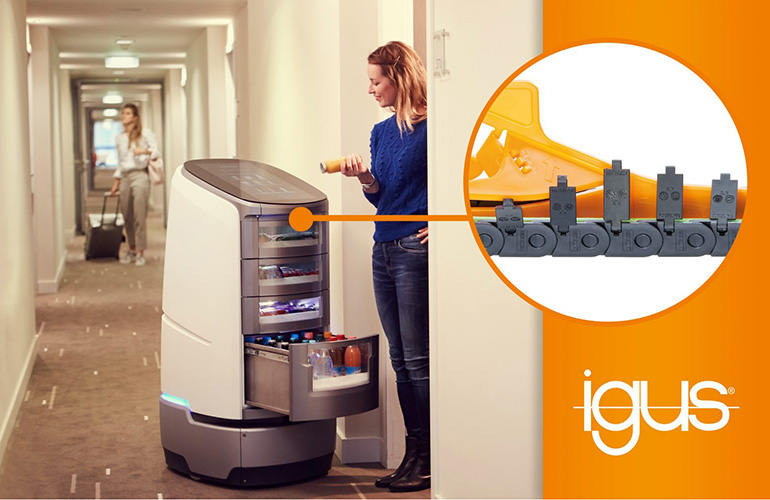|
Listen to this article |

Designed for dynamic applications, Robotise Technologies says the igus E2.10 cable carriers enable JEEVES to perform its role reliably. | Source: igus
igus GmbH has supplied its E2.10 series of e-chain plastic cable carriers as part of JEEVES. This robot from Robotise Technologies can autonomously navigate its environment and replace up to 300 hotel minibars.
Service robots like JEEVES are an increasingly in-demand type of automation. Fortune Business Insights estimated that the global service robotics market was valued at $16.35 billion in 2022 and projected that it will grow to $62.35 billion by 2030.
One of the main restraining factors for this market is the robot maintenance cost, which can range from $250,000 to $10,000 per year.
Robotise designs JEEVES for robustness
When Robotise Technologies was designing JEEVES, it found that the cables inside the robot’s extendable compartments were at risk for excessive bending, breakage, and freezing to the refrigerator’s cooling plate. The company knew a damaged JEEVES would cause great dissatisfaction for its customers, so it set out to find a solution to this problem.
Robotise was launched at the Technical University of Munich in 2015. It initially targeted potential users at airports, care homes, and hospitals before eventually settling on the hotel segment. The company said that with JEEVES, hotels can have one minibar that goes from room to room, however hundreds of rooms in all, instead of a minibar in each room.
Hotel guests can request a beverage or snack by calling from the room telephone or sending a message via the app to activate JEEVES. Standing 49.2 in. (124.9 cm) tall and weighing 220.4 lb. (100 kg), the robot uses a laser system, a 3D camera, and distance sensors to autonomously navigate to a guest’s room, even using the elevator.
Upon arrival, JEEVES notifies the guest through a phone call or app alert. The guest can then open the door, select a product, and complete the payment using the large touch display. The chosen item, such as a cold beer, energy drink, or bag of chips, is dispensed from one of the four drawers that open automatically.
Robotise also offers JOOLES, a UV disinfection robot for hospitals. The company claimed that JOOLES can disinfect surfaces in a patient’s room in about 10 minutes, and in an operating room in about 20 minutes.
In addition, Robotise provides MUULES, a service robot for industrial settings that can deliver small loads up to 200 kg (440.9 lb.).
igus cable carriers are a critical component
“A faulty robot waiter would immediately lead to resentment of the guests,” noted Clemens Beckmann, head of engineering at Robotise Technologies. “That’s why we attached great importance to making JEEVES as reliable as possible.”
igus said its cable carriers, constructed from high-performance plastics, guide the system’s energy and data cables, making it a critical component for a robot’s performance. The Cologne, Germany-based company added that its cable carriers resist wear and abrasion and are suitable for a wide temperature range.
The E2.10 e-chain has an inner height of 0.39 in (9.9 mm), a max cable diameter of 0.31 in (7.8 mm), an inner width of 0.24 in (6 mm), and a bending radius of 0.71 in (18 mm). It is installed above the guide rails of the drawers to save space, said igus.
The company said its cable carriers can improve efficiency and durability, minimize maintenance needs, and save costs.
igus, whose U.S. headquarters are in Rumford, R.I., develops and produces self-lubricating motion plastics. Its portfolio includes flexible cables, plain and linear bearings, and lead screw technology made of tribo-polymers.
In recent years, the company has expanded by creating internal startups, for technologies including ball bearings, robot drives, 3D printing, the RBTX platform for Lean Robotics, and “smart plastics.” igus won a 2024 RBR50 Robotics Innovation Award for its low-cost, human-like hand for the ReBeL collaborative robot.

